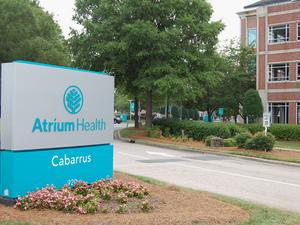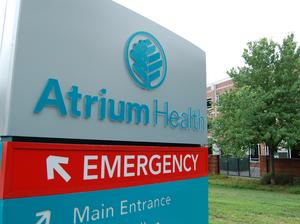
It's no secret. Covid-19 has accelerated the urgency to transform the health-care industry. The pandemic crushed once-normal business models and required typically years-long innovation to happen within a matter of weeks.
To drive change, Atrium Health is implementing a two-part strategy — Rise, to improve current processes, and Reshape, to think about what could drive future growth, said Dr. Rasu Shrestha, chief strategy and transformation officer at Atrium. He said health-care systems are shifting to a more holistic, experience-based outlook, in contrast to the transactional view they have held for decades.
Patient convenience and experience is the new quality-control metric, Shrestha said.
As an example, Charlotte-based Atrium stepped up quickly with its hospital-at-home program when the pandemic hit hard in early 2020. That model, with two virtual floors divided based on illness severity, has since worked with nearly 54,000 patients.
Shrestha was Monday's keynote speaker for RevTech Labs' Health Innovation Summit. The three-day event offers panel discussions, networking opportunities and other resources for attendees. It is being held in-person and virtually. RevTech Labs recently spun out from Queen City Fintech and Packard Place to incorporate other industries.

Shrestha said the goal is to combine technology with the human aspects of health care. It should not be an either/or situation. He named artificial intelligence-powered chatbots or care via mobile phone as examples.
"It's not just about slapping digital into everything, right? That's not what innovation truly is about," Shrestha told attendees via video. "If you apply digital to a process that's already broken, you'll essentially have a broken digital process."
Health-care systems already stand to lose at least $53 billion in total revenue this year, Shrestha said, citing a Kaufman Hall study.
Much of Atrium's health-care innovation will soon happen in a planned innovation district, a cross-section of health-care providers, businesses and researchers building off the Innovation Quarter in Winston-Salem. The new district is part of a four-year medical school coming to Charlotte that will act as a second campus of the Wake Forest School of Medicine.
The school will support about 3,500 residents, fellows and nursing students each year in more than 100 specialized programs between the Winston-Salem and Charlotte campuses. Earlier this year, Atrium was approved to open a third- and fourth-year site in 2022. The first four-year class will start in 2024.
That is one example of how industry transformation is going to happen through partnerships, Shrestha said.
There are more than 40 health-tech companies in the Charlotte area, according to a Charlotte Regional Business Alliance report. Services range from hospital management to online consultations and software for providers. The health-care sector has seen 17% growth since 2011, said Akofa Dossou, director of economic research at the Alliance.
Shrestha said health-care innovation will be a main driver in the next economic resurgence in Charlotte. He noted the importance of making the technology and educational resources available in an equitable way.








